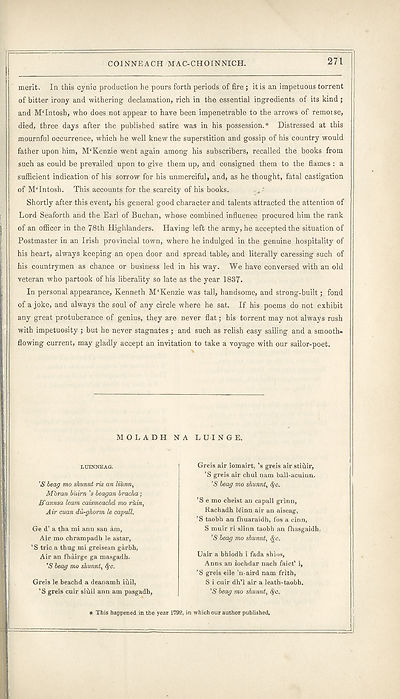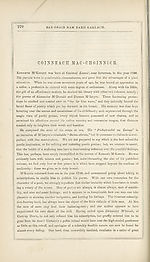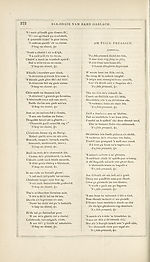Books and other items printed in Gaelic from 1871 to 1900 > Sar-obair nam bard Gaelach, or, The beauties of Gaelic poetry, and lives of the Highland bards
(351) Page 271
Download files
Complete book:
Individual page:
Thumbnail gallery: Grid view | List view

C01NNEACH MAC-CHOINNICH.
271
merit. In this cynic production he pours forth periods of fire ; it is an impetuous torrent
of bitter irony and withering declamation, rich in the essential ingredients of its kind;
and M‘lntosh, who does not appear to have been impenetrable to the arrows of remoise,
died, three days after the published satire was in his possession.* Distressed at this
mournful occurrence, which he well knew the superstition and gossip of his country would
father upon him, MfKenzie went again among his subscribers, recalled the books from
such as could be prevailed upon to give them up, and consigned them to the flames : a
sufficient indication of his sorrow for his unmerciful, and, as he thought, fatal castigation
of MfIntosh. This accounts for the scarcity of his books.
Shortly after this event, his general good character and talents attracted the attention of
Lord Seaforth and the Earl of Buchan, ■whose combined influence procured him the rank
of an officer in the 78th Highlanders. Having left the army, he accepted the situation of
Postmaster in an Irish provincial town, where he indulged in the genuine hospitality of
his heart, always keeping an open door and spread table, and literally caressing such of
his countrymen as chance or business led in his way. We have conversed with an old
veteran who partook of his liberality so late as the year 1837.
In personal appearance, Kenneth M‘Kenzie was tall, handsome, and strong-built; fond
of a joke, and always the soul of any circle where he sat. If his poems do not exhibit
any great protuberance of genius, they are never flat; his torrent may not always rush
with impetuosity ; but he never stagnates ; and such as relish easy sailing and a smooth¬
flowing current, may gladly accept an invitation to take a voyage with our sailor-poet.
MOLADH NA LUINGE.
LUINNEAG.
’S beag mo shunnt ris an liunn,
Mbran buirn's beagan bracha;
B'annsa leam caismeaclid mo ruin,
Air cuan du-ghorrn le capull.
Ge d’ a tha mi ann san am,
Air mo chrampadh le astar,
’S trie a thug mi greisean garbh,
Air an fhairge ga masgadh.
’S beag mo shunnt, fyc.
Greis le beachd a deanamh iiiil,
’S greis cuir sihil ann am pasgadh,
Greis air iomairt, ’s greis air stiuir,
’S greis air chul nam ball-acuinn.
’/S' beag mo shunnt, fyc.
’S e mo cheist an capall grinn,
Rachadh l£inn air an aiseag,
’S taobh an fhuaraidh, los a cinn,
S muir ri si inn taobh an fhasgaidh.
’S beag mo shunnt, <Jc.
Uair a bhiodh i fada shios,
Anns an iochdar nach faict' i,
’S greis eile ’n-aird nam frith,
S i cuir dh’i air a leath-taobh.
'S beag mo shunnt, fye.
* This happened in the year 1792, in which our author published.
271
merit. In this cynic production he pours forth periods of fire ; it is an impetuous torrent
of bitter irony and withering declamation, rich in the essential ingredients of its kind;
and M‘lntosh, who does not appear to have been impenetrable to the arrows of remoise,
died, three days after the published satire was in his possession.* Distressed at this
mournful occurrence, which he well knew the superstition and gossip of his country would
father upon him, MfKenzie went again among his subscribers, recalled the books from
such as could be prevailed upon to give them up, and consigned them to the flames : a
sufficient indication of his sorrow for his unmerciful, and, as he thought, fatal castigation
of MfIntosh. This accounts for the scarcity of his books.
Shortly after this event, his general good character and talents attracted the attention of
Lord Seaforth and the Earl of Buchan, ■whose combined influence procured him the rank
of an officer in the 78th Highlanders. Having left the army, he accepted the situation of
Postmaster in an Irish provincial town, where he indulged in the genuine hospitality of
his heart, always keeping an open door and spread table, and literally caressing such of
his countrymen as chance or business led in his way. We have conversed with an old
veteran who partook of his liberality so late as the year 1837.
In personal appearance, Kenneth M‘Kenzie was tall, handsome, and strong-built; fond
of a joke, and always the soul of any circle where he sat. If his poems do not exhibit
any great protuberance of genius, they are never flat; his torrent may not always rush
with impetuosity ; but he never stagnates ; and such as relish easy sailing and a smooth¬
flowing current, may gladly accept an invitation to take a voyage with our sailor-poet.
MOLADH NA LUINGE.
LUINNEAG.
’S beag mo shunnt ris an liunn,
Mbran buirn's beagan bracha;
B'annsa leam caismeaclid mo ruin,
Air cuan du-ghorrn le capull.
Ge d’ a tha mi ann san am,
Air mo chrampadh le astar,
’S trie a thug mi greisean garbh,
Air an fhairge ga masgadh.
’S beag mo shunnt, fyc.
Greis le beachd a deanamh iiiil,
’S greis cuir sihil ann am pasgadh,
Greis air iomairt, ’s greis air stiuir,
’S greis air chul nam ball-acuinn.
’/S' beag mo shunnt, fyc.
’S e mo cheist an capall grinn,
Rachadh l£inn air an aiseag,
’S taobh an fhuaraidh, los a cinn,
S muir ri si inn taobh an fhasgaidh.
’S beag mo shunnt, <Jc.
Uair a bhiodh i fada shios,
Anns an iochdar nach faict' i,
’S greis eile ’n-aird nam frith,
S i cuir dh’i air a leath-taobh.
'S beag mo shunnt, fye.
* This happened in the year 1792, in which our author published.
Set display mode to:
![]() Universal Viewer |
Universal Viewer | ![]() Mirador |
Large image | Transcription
Mirador |
Large image | Transcription
Images and transcriptions on this page, including medium image downloads, may be used under the Creative Commons Attribution 4.0 International Licence unless otherwise stated. ![]()
| Permanent URL | https://digital.nls.uk/109813285 |
|---|
| Description | Out-of-copyright books printed in Gaelic between 1631 and 1900. Also some pamphlets and chapbooks. Includes poetry and songs, religious books such as catechisms and hymns, and different editions of the Bible and the Psalms. Also includes the second book ever published in Gaelic in 1631. |
|---|

